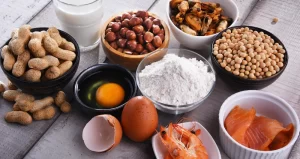Which Food Safety Practice Will Help Prevent Biological Hazards
Which Food Safety Practice Will Help Prevent Biological Hazards?
One crucial food safety practice that helps prevent biological hazards is proper handwashing. Food safety is paramount in the culinary world, whether you’re a professional chef or cooking at home. One of the most critical aspects of food safety is preventing biological hazards. These hazards can lead to foodborne illnesses that affect your health and have severe consequences for businesses and public health. This article will explore which food safety practice will help prevent biological hazards that can help prevent biological hazards.
Here are some key points which food safety practices will help prevent biological hazards related to handwashing and its role in preventing biological hazards in food:
Frequent and Thorough Handwashing: Food handlers should wash their hands frequently and thoroughly with warm water and soap, especially after using the restroom, touching their face, handling raw food, or other activities that may contaminate their hands.
Handwashing Technique: Proper handwashing involves scrubbing all parts of the hands, including between fingers and under nails, for at least 20 seconds. This helps remove harmful bacteria, viruses, and other microorganisms. Also, read about, Chef Tools
Glove Usage: Besides handwashing, using disposable gloves when handling ready-to-eat foods or when there are cuts or sores on the hands can provide an extra layer of protection against contamination.
Understanding Biological Hazards
Before delving into preventive measures, let’s understand what biological hazards are. Biological hazards in food refer to microorganisms, such as bacteria, viruses, and parasites, that can contaminate food and cause illnesses when consumed. Food’s most common biological hazards include Salmonella, E. coli, Listeria, and Norovirus.
The Importance of Hand Hygiene
One of the fundamental steps in preventing biological hazards is practicing proper hand hygiene. This applies not only to food handlers in restaurants but also to home cooks. Washing your hands thoroughly with soap and warm water for at least 20 seconds before and after handling food can significantly reduce the risk of contamination.
Temperature Control
Maintaining proper temperature control is crucial when it comes to food safety. Bacteria multiply rapidly at temperatures between 40°F (4°C) and 140°F (60°C), known as the “danger zone.” To prevent biological hazards, make sure to keep hot foods hot and cold foods cold. Use a food thermometer to ensure food reaches the recommended internal temperatures for safe consumption.
Cross-Contamination Prevention
Cross-contamination occurs when harmful microorganisms are transferred from one surface or food to another. To prevent this, use separate cutting boards and utensils for raw meat, poultry, and seafood. Also, thoroughly clean and sanitize countertops, knives, and other kitchen tools. Discover more about Wooden Cooking Utensils
Safe Food Handling
Proper food handling, which food safety practice that will help prevent biological hazards, is a comprehensive practice encompassing various aspects. Always defrost frozen foods in the refrigerator, never on the countertop. When marinating meats, do so in the refrigerator, not at room temperature. Cook food thoroughly, and if reheating leftovers, ensure they are heated to an internal temperature of 165°F (74°C).

Employee Training
In a restaurant setting, employee training is crucial to ensuring food safety. All staff members should receive proper training on handling food, incredibly raw ingredients. Regular training sessions and assessments help maintain high standards of food safety.
Sanitization and Cleaning
Maintaining a clean and sanitized kitchen environment is paramount. Regularly clean and disinfect all surfaces, including countertops, sinks, and kitchen equipment. Pay special attention to areas that come into contact with raw foods.
Avoiding Raw or Undercooked Foods
Consuming raw or undercooked foods, particularly raw eggs, raw seafood, and undercooked meats, increases the risk of biological hazards. To minimize this risk, cook these items thoroughly to destroy harmful microorganisms. Proper storage of food items can also prevent biological hazards. Store perishable foods in the refrigerator or freezer promptly. Be mindful of expiration dates and use the “first in, first out” principle when organizing your pantry and refrigerator.
Allergen Management
For individuals with food allergies, preventing cross-contact with allergenic ingredients is crucial. Labeling, segregating, and educating kitchen staff about allergen management is essential to protect customers from potential allergenic reactions.
The Role of Food Labels
Food labels are your allies in ensuring food safety. When purchasing packaged foods, read labels carefully. Look for information on storage instructions, use-by dates, and allergen warnings. This information can help you make informed decisions about the safety of the food you buy.
Importance of Personal Hygiene
In addition to hand hygiene, personal hygiene plays a crucial role in preventing biological hazards. If you’re a food handler, ensure that you maintain good personal hygiene practices, including wearing clean uniforms, using hairnets, and not touching your face or hair while handling food.
The quality of water used in food preparation is often overlooked but is of utmost importance. Contaminated water can introduce harmful microorganisms into the food. Always use clean and safe water sources for cooking, washing ingredients, and preparing beverages.
Food Safety During Travel
When traveling, which food safety practice will help prevent biological hazards to regions with different food safety standards, it’s essential to exercise caution. Avoid street food from unverified vendors, drink bottled water, and eat at reputable restaurants with good hygiene practices.
Regularly inspect your refrigerator at home and ensure it maintains a temperature below 40°F (4°C). Check for leaks or spills that could lead to cross-contamination. Also, store raw meats and seafood on lower shelves to prevent drips onto other foods.
Food Safety Technologies
Advancements in technology have led to innovative ways to ensure food safety. From smart refrigerators that monitor temperature to smartphone apps that provide food safety tips, these tools can assist in maintaining a safe kitchen environment. Many countries and organizations have established global food safety standards to ensure the safety of food products worldwide. Familiarize yourself with these standards, and when dining out or purchasing imported products, look for certifications that indicate compliance with these standards.
Advocacy and Awareness
Advocacy for food safety is essential to drive positive change in the food industry. Support organizations and initiatives promoting food safety awareness and holding businesses accountable for high standards.

In conclusion, preventing biological hazards in food requires knowledge, diligence, and proactive measures. Whether you are a professional in the food industry or a home cook, understanding and implementing these practices can help protect you and your loved ones from foodborne illnesses. Stay informed, practice food safety, and enjoy your meals with confidence.
Conclusion
In conclusion, which food safety practice will help prevent biological hazards? From proper hand hygiene to temperature control, cross-contamination prevention, safe food handling, and employee training, every step counts in ensuring our food is safe and free from harmful microorganisms.
Now, let’s address some frequently asked questions about food safety and biological hazards:
FAQs
What are the common symptoms of foodborne illnesses caused by biological hazards?
Foodborne illnesses can cause symptoms like nausea, vomiting, diarrhea, abdominal pain, fever, and muscle aches.
Is it safe to eat raw fish in sushi?
Sushi-grade fish is typically frozen to kill parasites before consumption, making it relatively safe. However, always ensure it comes from a reputable source.
How can I tell if food has gone wrong due to biological hazards?
Signs of spoiled food include off-putting odors, unusual textures, and mold growth. When in doubt, it’s best to discard it.
Can you get food poisoning from fruits and vegetables?
Yes, fruits and vegetables can carry biological hazards if not properly washed and handled. Wash them thoroughly before consumption.
What should I do if I suspect food poisoning?
If you suspect food poisoning, seek medical attention if symptoms are severe. Also, report the incident to your local health department to prevent further outbreaks.
